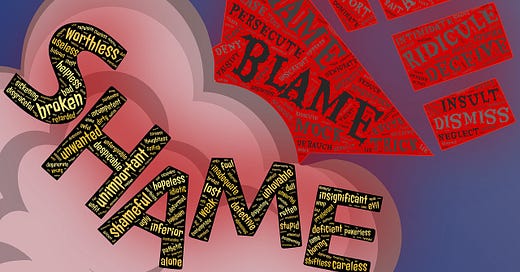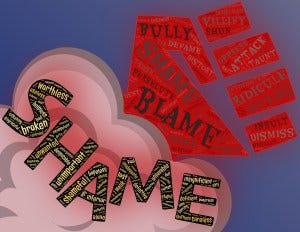When I was a boy, my grandmother was famous for blaming the survivor. How did she accomplish this? If anyone in the family caught a virus, she would immediately declare, "Well, you didn't wear your hat!" Other variations on the theme were such comments as, "You didn't button your coat, you didn't wear your scarf, you didn't wear your raincoat when it was raining." I will say in her defense that she meant no harm and was sincerely worried about the entire family.
For example, I have worked with many people over the years who were blamed for the unfortunate things they experienced. One terrible example was of rape. On several occasions, young clients told me their mothers refused to believe any rape occurred. On other occasions, female clients told me that family and friends blamed them for the rape. These clients were blamed for wearing sexually provocative clothes. Of course, what does someone consider provocative clothes or behavior?
It is always a heartache when a woman has a miscarriage. I know several cases where the pregnancy during the first trimester was going quite well. Both the father and mother were excited about having a baby. Suddenly, the worst happens, and the pregnant woman suffers a miscarriage as if this isn't enough of a misfortune to be told by mothers or mothers-in-law or extended family members and friends that the miscarriage was her fault. The blame usually comes from being told that she exercised, got too much rest, or ate too much or too little. The list goes on.
Why do some people blame the survivor of a trauma?
Several factors can contribute to blaming.
People who have not experienced a similar situation may struggle to empathize with victims. With firsthand knowledge and understanding of the emotions and challenges involved, it's easy to relate to the experiences of others.
People with cognitive biases are defined as systematic errors in thinking. It occurs when people process and interpret information in the world around them. It causes people to believe the world is fair and just. This bias makes it challenging to empathize with people because it conflicts with their belief that bad things only happen to those who deserve it. As a result of a cognitive bias, when someone is traumatized, they must have caused it to happen. Therefore, the trauma is their fault.
Survivors feel dehumanized by those who lack empathy. It can occur because of stereotypes, prejudices, or a lack of understanding about the victim's experiences and emotions. Dehumanization makes it easier for individuals to distance themselves emotionally and dismiss the suffering of others.
Some individuals may feel threatened by the victim's experiences or circumstances. After all, if that's what happened to him, it can happen to me. No, it must have been his fault. This fear can lead to a lack of empathy as people prioritize their safety and well-being over understanding and supporting the victim.
Societal attitudes and norms influence empathy levels. In some cultures or communities, victim-blaming or stigmatization of certain groups may be prevalent, leading to a lack of empathy for victims within those communities.
Empathy can be cultivated and developed through education, exposure to diverse perspectives, and fostering a culture of compassion and understanding. Empathy is crucial in supporting victims, promoting social justice, and creating a more compassionate society.
It is crucial to approach these situations with empathy, understanding, and support. Encouraging open communication, providing education about sexual assault, and connecting parents with resources such as support groups or counseling can help them better understand and respond to their child's report.
Tragically, I lost my wife to pancreatic cancer almost eight years ago. I will never forget the day we received the diagnosis. I was in the doctor's office with my wife when he gently told her about the cancer. Then, he looked at her intensely and said, "There is nothing you did to cause this." He expressed this with great empathy and compassion. Those words were a great relief for both of us. It enabled us to plan how we would handle this fatal illness.
This world needs a lot more empathy and love.
And a lot less blame and judgment.





